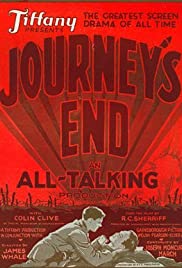
JOURNEYS END
UK, 1930, 120 minutes, Black-and-white.
Colin Clive, Ian Maclaren, David Manners, Billy Bevan, Anthony Bushell.
Directed by James Whale.
This is a film version of a celebrated play by R.C.Sheriff – remade for television in 1988 and with another cinema version in 2017. The success of the play and then of this film ensured that it was part of the British consciousness about World War I, war in the trenches, the consequences of warfare.
Most of the action takes place in the trenches and the audience is immersed in those trenches, the limitations, the conditions, the claustrophobia, idling and boredom, drink, clashes…
The film is strong in dialogue from the play. James Whale was at the beginning of his career and was soon to make an impact with his Frankenstein. But he also directed versions of Waterloo Bridge and, perhaps unexpectedly, Showboat, 1936. (He was portrayed by Ian Mc Kellen in the film, Gods and Monsters.)
Great praise is given to Colin Clive for his portrayal of the officer, Stanhope. Clive was to be Dr Frankenstein in James Whale’s two Frankenstein films.
Interesting comparisons can be made with the 2017 version, made 100 years after the events whereas in 1930, the events were only 13 years back and playwright and director had served in the trenches.
1. A film of 1930? Early sound techniques? Of its time? Yet its impact and power?
2. The play by R.C.Sheriff, his serving in the trenches? The fact that James Whale also fought in the trenches? Bringing the authenticity of their experiences?
3. Audience response to World War I stories, the impact of the war, memories of its politics? The involvement of the British? So many young men called up? The veterans? Active service, in the trenches, going over the top? The consequences for the men? Fear, boredom, claustrophobia, interactions – leading to stress or death?
4. The recreation of the atmosphere of war, the setting in the trenches, the physical effect of the trenches and the limitations? The musical score?
5. The portrait of Stanhope? In charge, the pressures on him, interactions with the men, the decisions? Sometimes severity? His drinking? The support from Osborne? Uncle? Having to deal with cowardice, Hibbert? The support from Mason? Some humour? His care for the young man, Raleigh? The good humour of Trotter?
6. The portrait of Raleigh, his age, experience, inexperience, in the trenches, dependence on Stanhope?
7. The portrait of Trotter, older, friendly, supportive?
8. The portrait of Osborne, older, the nickname of Uncle, his experience, supportive?
9. The portrait of Hibbert, the war experience, fears, cowardice, his situation handled by the others, by Stanhope?
10. The presence of the cook, his work, support of the men, touches of humour?
11. The immersion of the audience in the trenches, the atmosphere, the enemy, getting to appreciate the men, and the prospect of going over the top?